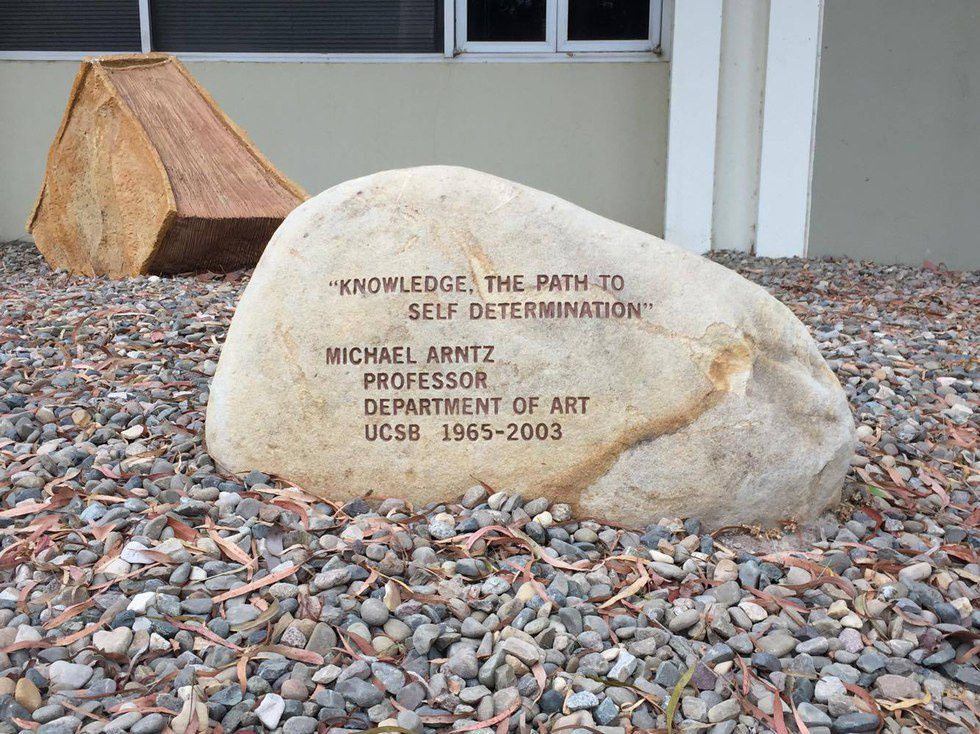"Knowledge, the path to self-determination."
It's just a small rock outside Broida (Physics) hall here at UCSB. Here, a small pay of respect lies for the professor Michael Arntz. Arntz was an art professor at UCSB from 1965-2003 and was incredibly accomplished in his work. He had one-person exhibitions in numerous locations across the country and in Japan and England.
The retired professor still shows his art around the Santa Barbara area but this rock stopped me in my tracks. Heading towards class where I am supposed to gain knowledge was where I evaluated my academic path.
This quote goes back to Maslow's Hierarchy of Needs, a classic psychology understanding that humans look towards their most basic needs before eventually moving to the feeling of "self-actualization." Maslow describes the hierarchy, but fails to identify how a human might move from one step to another. Arntz uses this quote as the answer towards a burning question that may have plagued many.
But I want to ask: "What does 'knowledge' lead to?"
In my science major, we are always encouraged to ask questions and be prepared to verify the results that we may find. After four to five years of education in college, it is an expectation that we are "enlightened" in our field but does it mean that we find ourselves?
The studying, the midterms, finals, social experience of college all can enhance our understanding of people and life. However, I contend that we will never achieve our full potential unless we know the plan that has been designed for us. I believe we can be satisfied and achieve our full potential without necessarily heeding to the perfect progression of needs.
Knowledge is a very earthly term, born out of the idea that you can gain your way to a kind of nirvana. As a Christian, I see the value in gaining knowledge and becoming an expert in a field, but I know that I am just a speck compared to the omniscient God I serve. A Bible story (Genesis 9:1-9) tells of when the people decided to build a tower so they "could make a name for themselves." God decides to scatter the people throughout the earth and create new languages.
There are vast expanses of our world and especially our universe that is so unknown. It took until the 1660s until the earth was discovered to not be at the center of the universe. It took until 1687 to discover why an apple falls to the ground the way it does. Just this year did we discover that gravity can be a wave particle.
Clearly, there are many questions that are unanswered. The feeling of humanistic self-actualization and self-determination can be falsely gained by achieving as much intelligence as possible. You can lie to yourself that you know your full potential but Professor Arntz, I believe the definite quote that you are known for can be adjusted.
The form of your sentence is that knowledge is the ONLY path to self-determination. But when I know God's will and plan for my life, I am satisfied because I know my full potential and can creatively work on making the world better. It is not a selfish, dog-eat-dog kind of path, but rather a path that receives satisfaction by helping others.
Professor Arntz, you have accomplished and achieved a lot of knowledge, but I invite you to find your true potential through a different path. Whenever I see myself relying on my knowledge or my own abilities, I become a more conflicted and less pleasant person to be around. But when I rely on the plan and will of my life that is more lasting, then the feeling of peace fills my heart.
So no, I find that knowledge is not the path. It is realizing you have none.






















